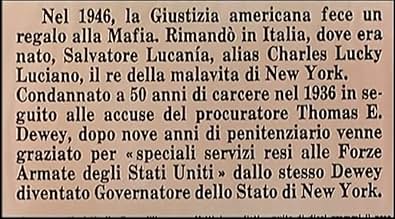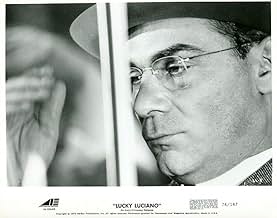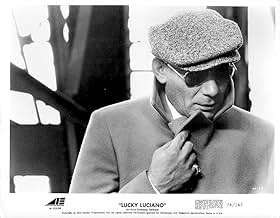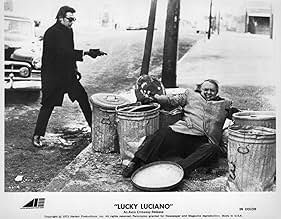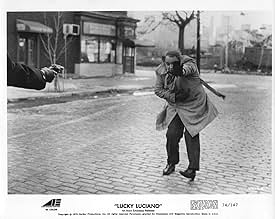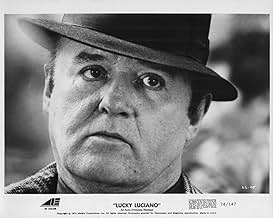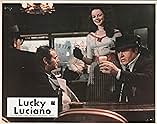IMDb रेटिंग
6.4/10
1.7 हज़ार
आपकी रेटिंग
अपनी भाषा में प्लॉट जोड़ेंBiopic of Mafia boss Lucky Luciano, covering his life from 1946 to 1962 with occasional flashbacks.Biopic of Mafia boss Lucky Luciano, covering his life from 1946 to 1962 with occasional flashbacks.Biopic of Mafia boss Lucky Luciano, covering his life from 1946 to 1962 with occasional flashbacks.
- पुरस्कार
- 2 जीत और कुल 2 नामांकन
Edmond O'Brien
- Commissioner Harry J. Anslinger
- (as Edmund O'Brien)
फ़ीचर्ड समीक्षाएं
This movie is boring. Plain boring, nothing else. And I've a great tolerance of movies that most people find boring.
I still wonder what I just watched. Is it a documentary? Most gangster films are pretty slow, but this one is more than that. All action happens in 15 minutes, then...nothing. It's like there was no editor, or that the material was shot for some kind of documentary.
Gian Maria Volontè plays his role very good. Rod Steiger is nice, but doesn't get enough time to be as great as he usually is. The rest of the cast is OK, not a problem here. Gangsters look like gangsters, cops look like cops and the dames are plenty.
For some seven years now I have been collecting gangster films, read books about the subject and even collected news articles about the mafia and such. Most of what I saw in this film is not new for me. Luciano was famous and is nothing short of legend these days. When he moved out of the US, he kind of got into the darkness. When this film dragged on, I saw some potential stories come by, but all just passed and went on. So nothing happened until the end where that thing happened that everyone that ever read a book about the mafia knows that happened.
The soundtrack doesn't help. Piero Piccioni can't even live up to his usual 'clone morricone' music and seems only to have written about 7 minutes of music.
The DVD I got was a UK version without any subtitle. I can watch English spoken films without much trouble, but half of this is in Italian, so beware! At first I feared this would have been a action movie disguised as a gangster film, but even that wasn't true. It is slow and all that. Of course, I never thought I was going to watch a true classic, but I almost felt asleep. Still, I cannot give it less than a 4. Gian Maria Volontè and Rod Steiger together in a film, and the sets were good enough. The production itself felt okay. So maybe they should have fired the writer and maybe the editor.
It could have been so much more!
I still wonder what I just watched. Is it a documentary? Most gangster films are pretty slow, but this one is more than that. All action happens in 15 minutes, then...nothing. It's like there was no editor, or that the material was shot for some kind of documentary.
Gian Maria Volontè plays his role very good. Rod Steiger is nice, but doesn't get enough time to be as great as he usually is. The rest of the cast is OK, not a problem here. Gangsters look like gangsters, cops look like cops and the dames are plenty.
For some seven years now I have been collecting gangster films, read books about the subject and even collected news articles about the mafia and such. Most of what I saw in this film is not new for me. Luciano was famous and is nothing short of legend these days. When he moved out of the US, he kind of got into the darkness. When this film dragged on, I saw some potential stories come by, but all just passed and went on. So nothing happened until the end where that thing happened that everyone that ever read a book about the mafia knows that happened.
The soundtrack doesn't help. Piero Piccioni can't even live up to his usual 'clone morricone' music and seems only to have written about 7 minutes of music.
The DVD I got was a UK version without any subtitle. I can watch English spoken films without much trouble, but half of this is in Italian, so beware! At first I feared this would have been a action movie disguised as a gangster film, but even that wasn't true. It is slow and all that. Of course, I never thought I was going to watch a true classic, but I almost felt asleep. Still, I cannot give it less than a 4. Gian Maria Volontè and Rod Steiger together in a film, and the sets were good enough. The production itself felt okay. So maybe they should have fired the writer and maybe the editor.
It could have been so much more!
If you look at the history of Italian mobster Lucky Luciano, you'll find that most of the interesting stuff that happened in his life was when he was young. Forming a street gang as a kid, being arrested numerous times, surviving being stabbed and beaten over and over again. Working for the old school, 'Moustache Pete'-type mafioso, Luciano sought to get rid of the old guard and get rid of the 'boss of all bosses' title that encouraged rivalry and instead put in place a commision of mob families that could be mediated and would avoid gang wars. It's a bit of mystery why this film starts at this point, skips his trial for pandering in the US, and goes almost straight away to his deportation to Italy.
We do get a bit about Luciano's involvement in the preparations of the invasion of Sicily and the immediate events following this (the mob basically controlling the black market while pretending they are doing the opposite, and also assisting the US army in sending intelligence back from Sicily), but a lot of this doesn't acutally involved Luciano at all! This, plus a sub plot involving Rod Steiger as a treacherous drug smuggler, mean that for about three quarters of the film, actor Gian Marie Volonte doesn't have much to do with the Luciano character.
The film jumps between various events which also fractures the narrative a bit more, but the film isn't a disaster, just a bit unengaging. Volonte, when he does have something to play about with, conveys Luciano as a charismatic, confident man, presenting himself as a charmer to the various journalists who follow him about and as an innocent deportee to the police who are trying to hang a drug smuggling charge on him.
Violence and action wise there's not much going for it, save for the murder of the old mafiosi at the start of the film. If you've read any history on Luciano, you'll know what happened to him in the end. It's interesting, but not the best way to end of film!
We do get a bit about Luciano's involvement in the preparations of the invasion of Sicily and the immediate events following this (the mob basically controlling the black market while pretending they are doing the opposite, and also assisting the US army in sending intelligence back from Sicily), but a lot of this doesn't acutally involved Luciano at all! This, plus a sub plot involving Rod Steiger as a treacherous drug smuggler, mean that for about three quarters of the film, actor Gian Marie Volonte doesn't have much to do with the Luciano character.
The film jumps between various events which also fractures the narrative a bit more, but the film isn't a disaster, just a bit unengaging. Volonte, when he does have something to play about with, conveys Luciano as a charismatic, confident man, presenting himself as a charmer to the various journalists who follow him about and as an innocent deportee to the police who are trying to hang a drug smuggling charge on him.
Violence and action wise there's not much going for it, save for the murder of the old mafiosi at the start of the film. If you've read any history on Luciano, you'll know what happened to him in the end. It's interesting, but not the best way to end of film!
This is the real story behind Lucky Luciano , born Salvatore Lucania November 24, 1897 – January 26, 1962, the high priest of crime , the detailed account the world's most powerful mobster who built an empire on a sea of blood . This international co-production by Italy/US/France deals with the deported crime boss who is sent back to Italy . This picture is plenty of mayhem , strong stuff , drama and amount of gangland violence . Biographic movie about the notorious kingpin Lucky Luciano , though depiction is about the final years , including various flashbacks . Lucky is one of the bosses of the Mafia and leader of Cosa Nostra or Mafia, and soon became a chief in the Reina Family during the height of the Castellammarese War. Then takes place a Mafian War between Salvatore Maranzano, who eventually defeated the faction headed by rival Joseph Masseria . After Masseria's murder , this position was short-lived, as Maranzano himself was murdered in 1931 . Then , the family is headed by Charles "Lucky" Luciano , eventually known as the Genovese Family. He orders the slaughter of 40 other responsible , a famous massacre nicknamed Sicilian Vespers , therefore becoming the only boss. But a few years later he is put into jail.
This landmark mobster movie is strong stuff , being dominated by the tenacious acting of Gian Maria Volonte as the gangster of the title who follows his way venomously since his US expulsion through criminal career in Naples and Sicily . As trivia , previous Federal Narcotics Agent Charles Siragusa , Lucky's real-life nemesis , plays himself . There appears several known gangsters as Vito Genovese well played by Charles Cioffi and the informer named Giannini rightly performed by Rod Steiger . Director Francesco Rosi's body-strewn look at the feud between gangsters , Commissioners and Judges, , but especially concerns about Lucky Luciano given a good interpretation by Volonte . This is a violence-ridden story full of action, drama, thriller , suspense but being overlong . The notorious gangster Lucky Luciano is splendidly played by Gian Maria Volonte who makes a good character study of one of the most colorful mobsters of the history . Glimmer and evocative cinematography by Pasqualino De Santis , though being necessary a correct remastering . Adequate and atmospheric musical score by Piro Piccioni .
The motion picture is well based on true events : Lucky Luciano was an Italian-born, naturalized American mobster born in Sicily. Luciano is considered the father of modern organized crime in the United States for splitting New York City into five different Mafia crime families and the establishment of the first Commission. He was the first official boss of the modern Genovese crime family. He was, along with his associate Meyer Lansky, instrumental in the development of the National Crime Syndicate in the United States. On January 3, 1946, as a presumed reward for his alleged wartime cooperation, now Governor Thomas E. Dewey reluctantly commuted Luciano's pandering sentence on condition that he does not resist deportation to Italy. As two federal immigration agents transported Luciano from Sing Sing prison to Ellis Island in New York Harbor for deportation proceedings . In Italy and Sicily begins becoming one of the chief of the Mafia. The US Army seems to refrain from interfering his business . But in 1946, Luciano secretly moved to Havana, Luciano's objective in going to Cuba was to be closer to the United States so that he could resume control over American Cosa Nostra operations and eventually return to the United States. Meyer Lansky was already established as a major investor in Cuban gambling and hotel projects . In October 1963, Valachi had testified before Subcommittee on Investigations of the U.S. Senate Committee on Government Operations that the Mafia did exist . Although Valachi's disclosures never led directly to the prosecution of many Mafia leaders, he was able to provide many details of its history, operations and rituals, as well as naming many members and the major crime families , Luciano among them . With the death of Maranzano, Luciano became the dominant organized crime boss in the United States. He had reached the pinnacle of America's underworld, directing criminal rules, policies and activities along with the other family bosses. Luciano also had his own crime family, which controlled lucrative criminal rackets in New York City such as illegal gambling, bookmaking, loan-sharking, drug trafficking and extortion. Luciano became very influential in labor and union activities and controlled the Manhattan Waterfront, garbage hauling, construction, Garment Center businesses and trucking.
This landmark mobster movie is strong stuff , being dominated by the tenacious acting of Gian Maria Volonte as the gangster of the title who follows his way venomously since his US expulsion through criminal career in Naples and Sicily . As trivia , previous Federal Narcotics Agent Charles Siragusa , Lucky's real-life nemesis , plays himself . There appears several known gangsters as Vito Genovese well played by Charles Cioffi and the informer named Giannini rightly performed by Rod Steiger . Director Francesco Rosi's body-strewn look at the feud between gangsters , Commissioners and Judges, , but especially concerns about Lucky Luciano given a good interpretation by Volonte . This is a violence-ridden story full of action, drama, thriller , suspense but being overlong . The notorious gangster Lucky Luciano is splendidly played by Gian Maria Volonte who makes a good character study of one of the most colorful mobsters of the history . Glimmer and evocative cinematography by Pasqualino De Santis , though being necessary a correct remastering . Adequate and atmospheric musical score by Piro Piccioni .
The motion picture is well based on true events : Lucky Luciano was an Italian-born, naturalized American mobster born in Sicily. Luciano is considered the father of modern organized crime in the United States for splitting New York City into five different Mafia crime families and the establishment of the first Commission. He was the first official boss of the modern Genovese crime family. He was, along with his associate Meyer Lansky, instrumental in the development of the National Crime Syndicate in the United States. On January 3, 1946, as a presumed reward for his alleged wartime cooperation, now Governor Thomas E. Dewey reluctantly commuted Luciano's pandering sentence on condition that he does not resist deportation to Italy. As two federal immigration agents transported Luciano from Sing Sing prison to Ellis Island in New York Harbor for deportation proceedings . In Italy and Sicily begins becoming one of the chief of the Mafia. The US Army seems to refrain from interfering his business . But in 1946, Luciano secretly moved to Havana, Luciano's objective in going to Cuba was to be closer to the United States so that he could resume control over American Cosa Nostra operations and eventually return to the United States. Meyer Lansky was already established as a major investor in Cuban gambling and hotel projects . In October 1963, Valachi had testified before Subcommittee on Investigations of the U.S. Senate Committee on Government Operations that the Mafia did exist . Although Valachi's disclosures never led directly to the prosecution of many Mafia leaders, he was able to provide many details of its history, operations and rituals, as well as naming many members and the major crime families , Luciano among them . With the death of Maranzano, Luciano became the dominant organized crime boss in the United States. He had reached the pinnacle of America's underworld, directing criminal rules, policies and activities along with the other family bosses. Luciano also had his own crime family, which controlled lucrative criminal rackets in New York City such as illegal gambling, bookmaking, loan-sharking, drug trafficking and extortion. Luciano became very influential in labor and union activities and controlled the Manhattan Waterfront, garbage hauling, construction, Garment Center businesses and trucking.
A sort of biography of Lucky Luciano the Italian mobster who was deported to Italy by USA's government after years in the jail, directed by the fine Francesco Rosi, the movie starts in this point when Lucky Luciano (Gian Maria Volonté) has been headed toward to Sicily at Italy by boat, mixed with few flashbacks concerning his violence background, he established at Sicily his homeland and Naples, where he manages all drug smuggling targeted to Europe and America, at its time post war the whole Italy was occupied by USA's Army and all major positions were chosen by American authorities, suggesting some agreement with local corrupts practices, upon this establishment the smooth Luciano feels free to work hidden over the shadows and becoming untouchable, however the unrelenting traffic ongoing peeves the American justice, sending to Italy an inspector to catch Lucky Luciano, the casting is the highlight of the slow paced picture, Gian Maria Volonté simply is great as Lucky, the almost unknowable Edmund O'Brien as Commissioner Anslinger also Rod Steiger as akind cheap mobster and Vincent Gardenia as the corrupt Colonel Charles Poletti, but don't expect too much, has many striking flaws strangely allowed by Rosi as portraits a modern New York as if it was on 1946, I'm trying wondering how it should happened over so magnificent director!!!
Resume:
First watch: 2020 / How many: 1 / Source: DVD / Rating: 7
Resume:
First watch: 2020 / How many: 1 / Source: DVD / Rating: 7
Reading some of the other reviews of Rossi's Lucky Luciano it is worth remembering that before it's release in 1974 the Italian film censors got their hands on Rossi's final cut and butchered it against his wishes, his protestations falling on deaf ears. It would appear this is the only cut that has survived official interference and, why I suspect it is so disjointed in its chronology. It is with this unwarranted and suspicious interference from the Italian censor that we should view this movie and which makes the content so much more revealing about the Italian state and how it's hidden hand works on different levels.
This is a very powerful and sophisticated film so both character and historical background knowledge is essential before viewing to make this a much more rewarding experience. Rossi is a master of political expose in cinema and deserves credit to agree releasing it in this pared down version - which must have stuck in his throat to do so at 100/110 minutes according to which distributors copy you buy -
This is a very powerful and sophisticated film so both character and historical background knowledge is essential before viewing to make this a much more rewarding experience. Rossi is a master of political expose in cinema and deserves credit to agree releasing it in this pared down version - which must have stuck in his throat to do so at 100/110 minutes according to which distributors copy you buy -
क्या आपको पता है
- ट्रिवियाIn Senses of Cinema's translation of an interview with film critic Michel Ciment for 'Le Dossier Rosi' (1976), director Francesco Rosi said of Charles Siragusa's war against Lucky Luciano: "He feels like the victim of a conspiracy he can't quite comprehend . . . that someone or something is stopping him from carrying out his work the way he wants to".
- गूफ़When Lucky Luciano is deported in the mid-Forties, far more modern buildings can be seen on the New York skyline.
- कनेक्शनFeatured in Diario napoletano (1992)
टॉप पसंद
रेटिंग देने के लिए साइन-इन करें और वैयक्तिकृत सुझावों के लिए वॉचलिस्ट करें
- How long is Lucky Luciano?Alexa द्वारा संचालित
विवरण
इस पेज में योगदान दें
किसी बदलाव का सुझाव दें या अनुपलब्ध कॉन्टेंट जोड़ें


